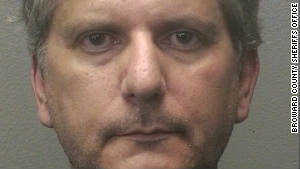September 29, 2011 -- Updated 1617 GMT (0017 HKT)
Anthony Mangione faces three charges related to child pornography, the Justice Department says.
STORY HIGHLIGHTS
- NEW: Report: Anthony Mangione will undergo a psychological evaluation
- NEW: He pleaded not guilty to the charges in federal court
- Mangione's indictment was unsealed Wednesday, authorities say
- If convicted, he faces up to 20 years in prison
-- The head of Immigration and Customs Enforcement for South Florida has been arrested on child pornography charges, the Department of Justice said Wednesday.
Anthony Mangione, 50, of Parkland, Florida, was charged in a three-count indictment unsealed Wednesday with transportation of child pornography, receipt of child pornography and possession of child pornography, authorities said in a statement.
"According to the indictment, between March 2010 and September 2010, Mangione allegedly transported and received visual depictions of minors engaging in sexually explicit conduct," the statement said. "The indictment also alleges that Mangione possessed electronically stored messages that contained additional images of child pornography during the same time period."
Mangione was arrested Tuesday by FBI agents and made an initial appearance Wednesday in federal court in West Palm Beach, Florida.
During the appearance, Mangione pleaded not guilty to the charges, according to CNN affiliate WPTV. Both the prosecution and the defense requested that he undergo a psychological evaluation, and the judge approved that request.
"The government has concerns that given the magnitude of the charges, that he might melt down," defense attorney David Howard told WPTV. "So there is ... real concern, and it's going to be addressed."
Attempts to contact Howard on Wednesday were not immediately successful.
Mangione, a 27-year law enforcement veteran, wore a gray jumpsuit with "federal prisoner" on the back in court Wednesday, and his hands and feet were shackled, WPTV said. He made no statement during the hearing.
He was being held in the Broward County jail, according to jail records.
A law enforcement official who asked not to be identified because he was not authorized to speak to the media said Mangione has been on leave from his job at ICE. WPTV reported that he was placed on paid administrative leave in April amid a federal investigation into four images on his home computer he allegedly received via e-mail.
According to its website, ICE targets and investigates child pornographers, child sex tourists and facilitators and human smugglers and traffickers of minors, among others. The agency developed Operation Predator, which it describes as "an initiative to identify, investigate and arrest child predators and sexual offenders."
If convicted, Mangione faces up to 20 years in prison, the Department of Justice said. He also faces a term of supervised release from five years to life following his prison sentence and he will be required to register as a sex offender.
"On the arrest of our former (special agent in charge) in Miami, we have cooperated fully in that investigation," ICE Director John Morton said Wednesday morning when asked about the case during a news conference on another matter. "We'll see how things unfold today, and beyond that, we don't have any comment."
The case is being investigated by the Broward County Sheriff's Office and the FBI, the Department of Justice said. Broward County referred questions to federal authorities, and the FBI referred them to the Department of Justice.
CNN's Ashley Hayes and Athena Jones contributed to this report.


 Cop this ... Rachel Weisz as UN observer Kathryn Bolkovac in a role based on a true story.
Cop this ... Rachel Weisz as UN observer Kathryn Bolkovac in a role based on a true story. 


